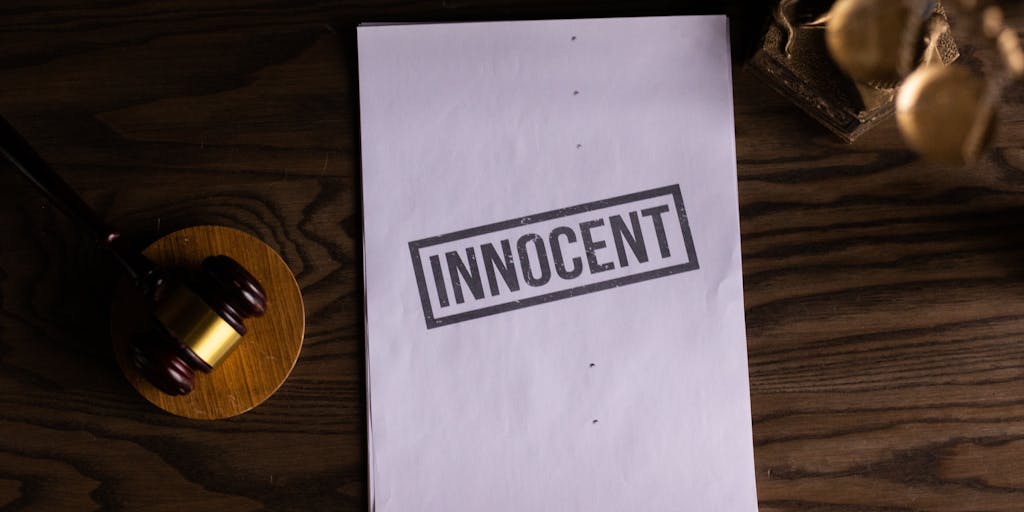Have you ever found yourself in a situation where you needed to drive, but your license was suspended? It’s a common predicament that can lead to serious consequences, including jail time. But don’t worry; understanding the laws and knowing your options can help you navigate this challenging situation. Let’s explore how you can avoid jail time for driving on a suspended license, particularly in Maryland.
Driving on a Suspended License in Maryland: Penalties & Fines

In Maryland, driving on a suspended license is not taken lightly. The state has strict laws in place to deter this behavior, and the penalties can be quite severe. If you’re caught driving with a suspended license, you could face:
- Fines: The fines for driving on a suspended license can range from $70 to $1,000, depending on the circumstances surrounding your case.
- Points on Your Driving Record: You may incur 12 points on your driving record, which can lead to further suspension of your driving privileges.
- Jail Time: In some cases, you could face up to one year in jail, especially if you have prior offenses.
These penalties can feel overwhelming, but understanding them is the first step in avoiding them. For instance, if you find yourself needing to drive, consider alternatives like public transportation or ridesharing services. It’s not just about avoiding fines; it’s about making responsible choices that keep you safe and legal.
Penalties For Driving on A Suspended and Revoked License in Maryland

It’s essential to differentiate between a suspended and a revoked license, as the penalties can vary significantly. A suspended license means your driving privileges are temporarily taken away, often due to unpaid fines or points accumulation. A revoked license, however, means your driving privileges have been permanently terminated until you take specific actions to reinstate them.
In Maryland, the penalties for driving on a revoked license can be even harsher:
- Increased Fines: You may face fines that can exceed $1,000, especially if you have multiple offenses.
- Longer Jail Sentences: The potential jail time can increase to two years for repeat offenders.
- Additional Legal Consequences: Driving on a revoked license can lead to further complications, such as increased insurance rates and difficulty obtaining a new license.
So, what can you do if you find yourself in this situation? First, it’s crucial to understand the reason behind your suspension or revocation. If it’s due to unpaid fines, consider reaching out to the court to discuss payment plans. Many courts are willing to work with you to avoid further penalties.
Additionally, consulting with a legal expert can provide you with tailored advice based on your specific circumstances. They can help you navigate the legal system and may even assist in reducing your penalties. Remember, knowledge is power, and being proactive can make a significant difference in your situation.
What is the Penalty for Driving on a Suspended License in Maryland?
Imagine you’re running late for an important meeting, and in a moment of desperation, you decide to drive, unaware that your license is suspended. It’s a scenario that many might find themselves in, but the consequences can be severe. In Maryland, driving on a suspended license is not taken lightly. The penalties can vary based on the reason for the suspension and whether it’s a first or subsequent offense.
Generally, if you’re caught driving with a suspended license, you could face a fine of up to $1,000 and potential jail time. The Maryland Vehicle Administration (MVA) has strict regulations, and they don’t hesitate to enforce them. For instance, if your license was suspended due to a DUI, the penalties can be even harsher, reflecting the state’s commitment to road safety.
According to the Maryland Department of Transportation, the state has seen a significant number of repeat offenders, which has led to stricter enforcement measures. This means that if you find yourself in this situation, it’s crucial to understand the implications fully. Not only could you face fines, but you may also have to deal with increased insurance rates and a longer suspension period.
What Are the Typical Fines and Sentences for Driving on a Suspended/Revoked License in Maryland?
When it comes to the financial repercussions of driving on a suspended or revoked license in Maryland, the numbers can be daunting. Typically, fines can range from $100 to $1,000, depending on the circumstances surrounding your case. But it’s not just about the fines; the potential for jail time looms large, especially for repeat offenders.
For a first offense, you might be looking at a fine and possibly a short jail sentence, often less than 60 days. However, if you’ve been caught driving on a suspended license multiple times, the stakes are raised significantly. In such cases, the court may impose a sentence of up to 1 year in jail. This is where the situation can escalate quickly, turning a simple mistake into a life-altering event.
Moreover, the MVA may also impose additional penalties, such as extending your suspension period or requiring you to complete a driver improvement program. It’s essential to consider these factors seriously. If you’re facing this situation, consulting with a legal expert can provide clarity and help you navigate the complexities of the law.
Could You Go to Jail for Driving on a Suspended License in Maryland?
The thought of jail time can be terrifying, and understandably so. Many people wonder, “Could I really go to jail for driving on a suspended license?” The answer is yes, especially in Maryland. The state takes this offense seriously, and the consequences can be severe, particularly for repeat offenders.
For instance, if you’re caught driving on a suspended license for the first time, you might face a fine and a brief jail sentence. However, if you have prior offenses, the likelihood of jail time increases significantly. A study by the Maryland Judiciary indicates that repeat offenders are often sentenced to serve time, reflecting the state’s zero-tolerance policy towards habitual offenders.
It’s also worth noting that the context of your suspension matters. If your license was suspended due to serious offenses like DUI or reckless driving, the penalties can be much harsher. In these cases, the court may impose a sentence that includes mandatory jail time, community service, or probation. This is why it’s crucial to address any license suspensions promptly and seek legal advice if you find yourself in this predicament.
Ultimately, the best way to avoid jail time is to stay informed and proactive. If your license is suspended, consider alternative transportation options, such as public transit or ridesharing, until you can resolve the issue. Remember, it’s always better to be safe than sorry!
What is the Difference Between Driving on a Suspended License and Driving on a Revoked License?
Understanding the nuances between a suspended license and a revoked license is crucial, especially if you find yourself in a situation where you might be tempted to drive. Imagine you’re running late for an important meeting, and you realize your license is suspended. You might think, “What’s the harm in just driving this one time?” But the implications can be serious.
A suspended license means that your driving privileges are temporarily taken away. This could be due to various reasons, such as failing to pay a traffic ticket, accumulating too many points on your driving record, or not having adequate insurance. The good news is that, in many cases, you can have your license reinstated after fulfilling certain conditions, like paying fines or completing a defensive driving course.
On the other hand, a revoked license is a more severe action. It means that your driving privileges have been permanently terminated, at least for a period of time. This often occurs after serious offenses, such as DUI (driving under the influence) or repeated violations. Unlike a suspension, a revocation requires you to go through a more rigorous process to regain your driving rights, which may include a hearing or additional testing.
In essence, while both situations are serious, a suspension is often seen as a temporary setback, whereas a revocation can feel like a more permanent barrier. Knowing this difference can help you make informed decisions about your driving habits and the potential consequences of getting behind the wheel.
What if You Did Not Know Your Driver’s License Was Suspended?
Picture this: you’re driving along, blissfully unaware that your license has been suspended. Maybe you missed a notice in the mail or didn’t realize that an unpaid ticket had led to this consequence. It’s a common scenario, and it raises an important question: can ignorance protect you from legal repercussions?
Unfortunately, the answer is generally no. The law typically holds individuals responsible for knowing the status of their driving privileges. However, there are some nuances to consider. For instance, if you can prove that you did not receive any notification about the suspension, you might have a case to argue in court. This could involve showing evidence that the notice was sent to an incorrect address or that you were otherwise unaware due to circumstances beyond your control.
It’s also worth noting that some states have provisions for “innocent” drivers. For example, if you can demonstrate that you were not at fault for the suspension—perhaps it was due to a clerical error—you may be able to avoid penalties. However, this often requires legal assistance and can be a lengthy process.
To avoid such situations, it’s wise to regularly check your driving record, especially if you suspect any issues. Many states offer online services where you can verify your license status. Staying proactive can save you from the stress and potential legal troubles of driving on a suspended license.
What are the Reasons for a Suspension or Revocation?
Have you ever wondered what could lead to the suspension or revocation of your driver’s license? It’s a topic that often feels distant until it hits close to home. Understanding the reasons behind these actions can help you navigate your driving responsibilities more effectively.
Here are some common reasons for license suspension:
- Unpaid Traffic Tickets: Failing to pay fines can lead to a suspension. It’s a reminder that even minor infractions can snowball into bigger issues.
- Excessive Points: Accumulating too many points on your driving record due to speeding or other violations can trigger a suspension.
- Driving Under the Influence (DUI): This is one of the most serious offenses, often resulting in immediate suspension or revocation.
- Failure to Maintain Insurance: Driving without valid insurance can lead to suspension, as it poses a risk to public safety.
- Medical Conditions: Certain health issues that impair your ability to drive safely can also result in a suspension.
Revocation, on the other hand, is typically reserved for more severe violations, such as:
- Repeated DUI Offenses: Multiple offenses can lead to a permanent revocation of your driving privileges.
- Felony Convictions: Some felony charges, particularly those involving vehicles, can result in revocation.
- Driving Without a License: If you’re caught driving without a valid license, it can lead to revocation.
Understanding these reasons not only helps you stay informed but also empowers you to make better choices on the road. Remember, driving is a privilege, not a right, and it comes with responsibilities that we all must uphold.
How Does a License Get Suspended?
Have you ever found yourself wondering how a simple mistake can lead to the suspension of your driving privileges? It’s a reality that many face, often without fully understanding the reasons behind it. Let’s dive into the common causes of license suspension, so you can better navigate the roads ahead.
Point Suspension
One of the most prevalent reasons for license suspension is the accumulation of points on your driving record. Each state has its own point system, but generally, points are assigned for various traffic violations. For instance, speeding might earn you two points, while reckless driving could add five. Once you reach a certain threshold—often around 12 points within a year—your license may be suspended.
Imagine this: you’re running late for work, and in a moment of frustration, you speed through a yellow light. That single decision could add points to your record, and if you’re not careful, it could lead to a suspension. According to the National Highway Traffic Safety Administration (NHTSA), nearly 30% of drivers have points on their licenses, which highlights just how common this issue is.
To avoid this fate, it’s crucial to stay informed about your state’s point system and to drive defensively. Regularly checking your driving record can also help you catch any potential issues before they escalate. Remember, knowledge is power, and being proactive can save you from the stress of a suspended license.
DUI/DWI
Driving under the influence (DUI) or driving while intoxicated (DWI) is another serious offense that can lead to immediate license suspension. The consequences of a DUI are severe and can vary significantly from state to state. For example, in California, a first-time DUI offense can result in a four-month license suspension, while repeat offenders may face longer suspensions and even mandatory alcohol education programs.
Consider the story of a friend who, after a night out, thought they were fine to drive home. A routine traffic stop turned into a life-altering moment when they were charged with a DUI. Not only did they face legal penalties, but they also had to grapple with the emotional fallout of their decision. According to the Centers for Disease Control and Prevention (CDC), about 29 people die every day in the U.S. due to alcohol-impaired driving, underscoring the importance of making safe choices.
To steer clear of a DUI, always plan ahead. Use rideshare services, designate a sober driver, or simply stay where you are until you’re sober. It’s a small price to pay for your safety and the safety of others on the road.
Is there anyway I can avoid mandatory jail time for driving with suspended license (after suspension period)?

Finding yourself behind the wheel with a suspended license can feel like a daunting situation, and the fear of jail time looms large. But before we dive into the specifics of avoiding those dreaded handcuffs, let’s take a moment to understand the landscape of driving privileges and the legal ramifications that come with them. You might be surprised to learn that there are indeed ways to navigate this tricky terrain.
First, it’s essential to recognize that laws vary significantly from state to state. In some jurisdictions, driving on a suspended license can lead to mandatory jail time, while others may offer alternatives like fines or community service. Understanding your local laws is the first step in crafting a strategy to avoid jail time.
One effective approach is to seek legal counsel. A knowledgeable attorney can provide insights tailored to your specific situation, potentially negotiating a plea deal or alternative sentencing options. For instance, in many cases, judges may be willing to consider your circumstances—like whether you were driving to work or an emergency—when determining your sentence.
Additionally, demonstrating a commitment to rectifying your situation can go a long way. If you can show that you’ve taken steps to reinstate your license or have enrolled in a driving safety course, this proactive behavior may sway a judge’s decision in your favor. Remember, the goal is to present yourself as someone who is taking responsibility for their actions.
Ultimately, while the fear of jail time is real, there are pathways to mitigate the consequences. By understanding your rights, seeking legal advice, and showing a willingness to make amends, you can navigate this challenging situation with greater confidence.
How Does a License Get Revoked?
Understanding how a license gets revoked is crucial in preventing future issues. A license can be suspended or revoked for various reasons, and knowing these can help you avoid pitfalls. Common causes include:
- Traffic Violations: Accumulating too many points on your driving record due to speeding, reckless driving, or DUI can lead to suspension.
- Failure to Pay Fines: Not paying traffic tickets or court-ordered fines can result in a suspended license.
- Medical Conditions: Certain medical conditions that impair your ability to drive safely can lead to a revocation.
- Insurance Issues: Driving without insurance or failing to maintain required coverage can also trigger suspension.
Each of these scenarios can feel overwhelming, but they also serve as valuable lessons. For instance, if you’ve received a ticket, addressing it promptly can prevent it from escalating into a suspension. It’s all about staying informed and proactive.
How To Reinstate Your License
So, what happens when your license is suspended? The good news is that reinstating your license is often a manageable process, albeit one that requires diligence. Here’s a step-by-step guide to help you navigate the reinstatement process:
- Understand the Reason for Suspension: Start by checking with your local Department of Motor Vehicles (DMV) to understand why your license was suspended. This will guide your next steps.
- Fulfill Requirements: Depending on the reason for your suspension, you may need to complete specific requirements, such as paying fines, attending traffic school, or providing proof of insurance.
- Submit an Application: Once you’ve met all requirements, you’ll need to submit an application for reinstatement. This often involves filling out forms and paying a reinstatement fee.
- Pass Any Required Tests: In some cases, you may need to retake the written, vision, or even driving tests to prove your readiness to return to the road.
- Stay Informed: Keep track of any changes in your status and ensure that you’re aware of any additional requirements that may arise.
Reinstating your license can feel like a mountain to climb, but remember, every step you take is a step toward regaining your freedom on the road. It’s about taking responsibility and showing that you’re committed to being a safe and law-abiding driver.
Maryland Driving on a Suspended License Lawyer

Have you ever found yourself in a situation where you’re driving, and suddenly you remember that your license is suspended? It’s a heart-stopping moment, isn’t it? In Maryland, the stakes can be particularly high, and understanding your options is crucial. This is where a specialized lawyer can make a world of difference.
Hiring a Maryland driving on a suspended license lawyer can provide you with the guidance you need to navigate the legal maze. These professionals are well-versed in the intricacies of Maryland traffic laws and can help you understand the potential consequences of your situation. For instance, did you know that driving on a suspended license can lead to fines, additional suspension periods, or even jail time? A knowledgeable lawyer can advocate on your behalf, potentially reducing penalties or even helping you regain your driving privileges sooner.
Consider the case of John, a Maryland resident who found himself facing charges for driving with a suspended license. With the help of a skilled attorney, he was able to present mitigating circumstances, such as a medical emergency that necessitated his driving. The lawyer negotiated a plea deal that allowed John to avoid jail time and instead complete community service. This example illustrates how having the right legal representation can turn a daunting situation into a manageable one.
Ultimately, if you find yourself in this predicament, remember that you’re not alone. Seeking legal counsel can provide clarity and support, helping you to navigate the complexities of your case with confidence.
Suspended License Tickets
Receiving a ticket for driving on a suspended license can feel like a punch to the gut. It’s not just about the immediate consequences; it’s about the ripple effects that can impact your life. But what exactly does a suspended license ticket entail, and how can you handle it effectively?
When you receive a suspended license ticket, it typically means that your driving privileges have been revoked due to various reasons, such as unpaid fines, failure to appear in court, or accumulating too many points on your driving record. The ticket itself can carry hefty fines and may lead to further legal complications.
For example, in Maryland, the penalties for driving on a suspended license can include fines ranging from $1,000 to $2,500, depending on the circumstances. Additionally, you may face points on your driving record, which can lead to increased insurance rates and further restrictions on your driving privileges.
So, what can you do if you find yourself with a suspended license ticket? First, it’s essential to understand the reason behind your suspension. If it’s due to unpaid fines, addressing those promptly can sometimes lead to a reinstatement of your license. Moreover, consulting with a traffic attorney can provide you with options to contest the ticket or negotiate a lesser penalty. Remember, knowledge is power, and being proactive can help you regain control of your driving situation.
Suspended License Convictions For Teens
As a parent, the thought of your teenager facing a suspended license conviction can be terrifying. It’s a situation that not only affects their freedom but can also have long-lasting implications on their future. So, how can we navigate this challenging landscape together?
Teenagers are often more prone to risky behaviors, and driving on a suspended license can be one of them. In many states, including Maryland, the consequences for teens caught driving with a suspended license can be severe. A conviction can lead to additional suspension periods, fines, and even mandatory community service. But it’s not just about the legal ramifications; it can also impact their ability to secure jobs or pursue higher education.
Take the story of Sarah, a 17-year-old who was caught driving on a suspended license after her parents had failed to pay a traffic fine. The consequences were immediate: her license was suspended for an additional six months, and she was required to complete 40 hours of community service. This experience not only taught her a valuable lesson about responsibility but also highlighted the importance of open communication between parents and teens regarding driving privileges.
As a parent, it’s essential to have ongoing conversations with your teen about the importance of adhering to traffic laws and the potential consequences of their actions. Encouraging them to take responsibility for their driving record can foster a sense of accountability that will serve them well into adulthood. Remember, it’s not just about avoiding jail time; it’s about instilling values that will guide them throughout their lives.
Legal Advice on DUI & DWI
When it comes to driving under the influence (DUI) or driving while intoxicated (DWI), the stakes are incredibly high. You might be wondering, “What should I do if I find myself in this situation?” First and foremost, it’s essential to understand that the legal landscape surrounding DUI and DWI charges can be complex and varies significantly from state to state. Seeking legal advice from a qualified attorney is crucial, as they can provide tailored guidance based on your specific circumstances.
For instance, in many jurisdictions, first-time offenders may have the option of attending a diversion program, which can lead to reduced charges or even dismissal. According to a study by the National Highway Traffic Safety Administration, states that offer such programs have seen a decrease in repeat offenses. This highlights the importance of not only understanding your rights but also exploring all available options.
Moreover, it’s vital to be aware of the potential consequences of a DUI or DWI conviction. These can include hefty fines, mandatory alcohol education programs, and even community service. In some cases, you might face jail time, especially if there are aggravating factors such as prior offenses or accidents involving injury. A seasoned attorney can help you navigate these waters, potentially negotiating plea deals or alternative sentencing options that could keep you out of jail.
Remember, the goal is not just to avoid jail time but to learn from the experience and make better choices moving forward. Engaging in community support groups or counseling can demonstrate to the court that you are taking responsibility for your actions, which can be a significant factor in your favor.
What is the likelihood that I’m going to jail tomorrow?
Facing the possibility of jail time can be a terrifying thought. You might be sitting there, heart racing, wondering, “What are the chances that I’ll end up behind bars tomorrow?” The answer isn’t straightforward, as it depends on several factors, including your prior record, the specifics of your case, and the laws in your state.
For example, if this is your first offense and there were no aggravating circumstances, such as an accident or high blood alcohol content (BAC), the likelihood of immediate jail time may be lower. Many first-time offenders receive probation or alternative sentencing options instead. However, if you have a history of DUIs or if your actions resulted in harm to others, the chances of facing jail time increase significantly.
According to a report from the Bureau of Justice Statistics, nearly 30% of individuals convicted of DUI offenses serve time in jail, but this varies widely based on individual circumstances. It’s also worth noting that some states have mandatory minimum sentences for certain offenses, which can further complicate your situation.
Ultimately, the best course of action is to consult with a legal professional who can assess your case and provide you with a clearer picture of what to expect. They can help you understand the potential outcomes and guide you through the legal process, alleviating some of that anxiety you might be feeling.
What is the likelihood that I go to jail?
As you ponder the question of jail time, it’s essential to consider the various elements that contribute to this outcome. Think of it like a recipe; each ingredient plays a role in the final dish. Your prior driving record, the circumstances surrounding your arrest, and even the judge’s disposition can all influence whether you’ll face jail time.
For instance, if you were pulled over for a minor traffic violation and subsequently charged with a DUI, your chances of jail time might be lower than if you were involved in a serious accident while intoxicated. A study published in the Journal of Criminal Justice found that individuals with clean records were less likely to receive jail sentences compared to repeat offenders.
Additionally, the legal representation you choose can significantly impact your outcome. A skilled attorney can advocate on your behalf, potentially reducing charges or negotiating for alternatives to incarceration. They might argue for community service or rehabilitation programs, which can be more beneficial for both you and society.
In the end, while the fear of jail time is valid, it’s important to remember that there are often paths to avoid it. By taking proactive steps, such as seeking legal counsel and demonstrating a commitment to change, you can improve your chances of a favorable outcome. So, take a deep breath, gather your resources, and remember that you’re not alone in this journey.
How likely am I to go to prison?
When faced with the daunting prospect of driving on a suspended license, many people wonder, “How likely am I to go to prison?” It’s a valid concern, especially when the stakes feel so high. The truth is, the likelihood of incarceration largely depends on several factors, including your state laws, the circumstances surrounding your suspension, and your driving history.
For instance, in some states, driving on a suspended license is treated as a misdemeanor, which may result in fines or community service rather than jail time. However, if your suspension is due to a serious offense, such as a DUI, the penalties can escalate significantly. According to a study by the National Highway Traffic Safety Administration, repeat offenders face harsher consequences, including potential jail time.
Consider the story of John, who found himself in a similar situation. After a DUI conviction, he had his license suspended. One evening, in a moment of desperation, he drove to pick up his sick child from school. When pulled over, he faced not only fines but also the possibility of jail time. Fortunately, John’s attorney was able to negotiate a plea deal, emphasizing his clean driving record prior to the incident. This highlights the importance of legal representation and understanding your rights.
Ultimately, while the fear of prison is real, many factors come into play. Engaging with a knowledgeable attorney can help you navigate these waters and potentially avoid the worst-case scenario.
Will I get arrested after 3 court extensions for DUI Classes?
If you’ve been granted multiple extensions for DUI classes, you might be wondering, “Will I get arrested?” It’s a common concern, especially when you feel like you’re walking a tightrope. The answer isn’t straightforward, but let’s break it down together.
First, it’s essential to understand that courts typically grant extensions for valid reasons, such as personal hardships or scheduling conflicts. However, if you find yourself needing multiple extensions, it may raise red flags with the judge. According to legal experts, consistent failure to comply with court orders can lead to a bench warrant for your arrest.
Take the case of Sarah, who struggled to complete her DUI classes due to work commitments. After three extensions, she was anxious about her next court date. Fortunately, she proactively communicated with her attorney and the court, explaining her situation. This transparency helped her avoid arrest and ultimately complete her classes. It’s a reminder that open communication can often mitigate potential issues.
In short, while multiple extensions can lead to complications, staying proactive and maintaining communication with the court can help you navigate this challenging situation without facing arrest.
Am I going to be held responsible for a crime I didn’t do?
One of the most unsettling thoughts that can cross your mind is, “Am I going to be held responsible for a crime I didn’t do?” This question can feel particularly pressing if you’re facing charges related to driving on a suspended license or a DUI. The good news is that the legal system is designed to protect the innocent, but it can be a complex maze to navigate.
In many cases, individuals are wrongfully accused due to misunderstandings or errors in the system. For example, if your license was suspended due to a clerical error or if you were not the driver at the time of the incident, you may have grounds to contest the charges. Legal experts emphasize the importance of gathering evidence, such as witness statements or documentation, to support your case.
Consider the experience of Mike, who was pulled over while driving a friend’s car. Unbeknownst to him, his friend had a suspended license. Initially, Mike feared he would be held responsible for a crime he didn’t commit. However, with the help of a skilled attorney, he was able to prove he was not the owner of the vehicle and had no knowledge of the suspension. This case illustrates that with the right support and evidence, you can defend yourself against wrongful accusations.
In conclusion, while the fear of being held responsible for a crime you didn’t commit is valid, remember that the legal system has mechanisms in place to protect your rights. Seeking legal counsel and being proactive in your defense can make all the difference.
If I’m off to work abroad, do I need to bother about anything with precharge bail and RUI stuff?
Imagine you’ve landed a dream job abroad, and the excitement is palpable. But then, a nagging thought creeps in: what about that precharge bail or the RUI (Release Under Investigation) situation back home? It’s a valid concern, and it’s essential to address it before you pack your bags.
When you’re facing a precharge bail, it means you’ve been released from custody but are still under investigation for a potential charge. If you leave the country, you might inadvertently complicate your legal situation. Courts often require you to appear for hearings, and failing to do so could lead to a warrant for your arrest. It’s like leaving a party without saying goodbye; it can leave a bad taste in everyone’s mouth, including the legal system.
Experts recommend consulting with a legal professional before making any travel plans. They can provide clarity on your obligations and help you navigate the complexities of your situation. For instance, if you’re under RUI, your attorney might advise you to stay put until the investigation concludes, ensuring you don’t face additional charges for failing to appear.
Ultimately, while the allure of a new adventure is tempting, it’s crucial to ensure that your legal matters are settled. Think of it as tidying up your space before moving; it makes the transition smoother and less stressful.
[Maryland] Ticket for Driving with Suspended License. Should I get a lawyer?
Receiving a ticket for driving with a suspended license can feel like a heavy weight on your shoulders, especially in Maryland, where the laws can be quite stringent. You might be wondering, “Is hiring a lawyer really necessary?” The short answer is: yes, it often is.
Consider this: a lawyer can be your best ally in navigating the legal maze. They understand the nuances of Maryland’s traffic laws and can help you explore options that might not be immediately apparent. For example, if you can prove that you were unaware of your license suspension, a skilled attorney might be able to negotiate a lesser charge or even get the ticket dismissed.
Moreover, the consequences of driving with a suspended license can be severe, including hefty fines, points on your driving record, and even jail time. According to the Maryland Department of Transportation, repeat offenders face increasingly harsh penalties. This is where a lawyer’s expertise becomes invaluable. They can advocate on your behalf, potentially reducing the penalties you face.
In a recent case, a Maryland resident found themselves in a similar predicament. After consulting with a lawyer, they learned about a diversion program that allowed them to avoid a criminal record altogether. This not only saved them from immediate penalties but also preserved their future driving privileges.
So, if you find yourself in this situation, don’t hesitate to reach out for legal help. It’s an investment in your peace of mind and future mobility.
Caught Driving While Suspended
Getting caught driving while your license is suspended can feel like a nightmare unfolding in slow motion. You might be thinking, “How did I let it get this far?” It’s a common scenario, and many people find themselves in similar situations, often due to a lack of awareness about their license status.
First, let’s talk about the emotional aspect. It’s easy to feel overwhelmed and anxious, but remember, you’re not alone. Many individuals have faced this challenge and have successfully navigated their way through it. The key is to take proactive steps. For instance, if you’re pulled over, remain calm and respectful. A positive demeanor can sometimes influence the officer’s approach to the situation.
Once you’ve been caught, the next steps are crucial. You’ll likely receive a citation, and it’s essential to understand the implications. Depending on your state’s laws, penalties can range from fines to jail time. In Maryland, for example, the penalties can escalate quickly, especially for repeat offenders. According to a study by the Maryland Transportation Authority, nearly 30% of individuals caught driving with a suspended license were unaware of their status.
Seeking legal counsel is a wise move at this juncture. A lawyer can help you understand your rights and options, potentially mitigating the consequences you face. They might suggest attending a traffic school or applying for a hardship license, which allows you to drive for essential purposes like work or medical appointments.
In conclusion, while being caught driving with a suspended license can feel daunting, it’s important to remember that there are paths forward. By staying informed, seeking legal advice, and taking responsibility for your actions, you can navigate this challenge and emerge stronger on the other side. After all, every setback can be a setup for a comeback.
Going to traffic court for driving while suspended drivers license, any tips
Facing traffic court can feel daunting, especially when it involves a suspended license. You might be wondering, “What should I expect?” or “How can I improve my chances?” Let’s break it down together.
First, preparation is key. Gather all relevant documents, including your driving record, any correspondence from the DMV, and proof of any steps you’ve taken to rectify the situation, such as completing a driver’s education course or paying fines. This shows the court that you’re taking responsibility for your actions.
When you arrive at court, dress appropriately. Think of it as a job interview; you want to present yourself as respectful and serious about the matter at hand. A neat appearance can make a positive impression on the judge.
During the hearing, be honest and straightforward. If you made a mistake, acknowledge it. Judges appreciate sincerity and may be more lenient if they see you’re genuinely remorseful. You might say something like, “I understand the seriousness of my actions and am committed to making better choices moving forward.”
Consider seeking legal advice. A lawyer who specializes in traffic violations can provide invaluable insights and may help negotiate a lesser penalty or even a dismissal, depending on your circumstances. They can also guide you on whether to plead guilty or not guilty, based on the specifics of your case.
Lastly, remember that you’re not alone. Many people have faced similar situations, and there are resources available to help you navigate this challenging time. Whether it’s support groups or online forums, connecting with others can provide comfort and practical advice.
License Suspended After DUI
Getting your license suspended after a DUI can feel like a heavy weight on your shoulders. You might be grappling with feelings of shame or frustration, but it’s important to remember that this is a chance for growth and change. Let’s explore what this means for you and how to move forward.
First, understand the implications of a DUI. In many states, a first-time DUI offense can lead to a license suspension ranging from a few months to several years, depending on the severity of the incident and your blood alcohol content (BAC) at the time of arrest. For instance, in California, a first offense can result in a six-month suspension, while repeat offenders face harsher penalties.
But don’t lose hope. Many states offer programs that allow you to apply for a restricted license, which lets you drive to work, school, or treatment programs. This can be a lifeline during a challenging time. For example, in Florida, you can apply for a hardship license after completing a DUI program, allowing you to regain some independence.
Moreover, consider this an opportunity to reflect on your choices. Engaging in counseling or support groups can be incredibly beneficial. Programs like Alcoholics Anonymous (AA) not only provide support but also help you build a network of individuals who understand your struggles. This can be a powerful step toward personal growth and preventing future incidents.
Finally, remember that many people have successfully navigated this path. You’re not defined by your past mistakes. With determination and the right support, you can emerge from this experience stronger and more aware of the choices you make.
Driving with suspended license in Maryland
Driving with a suspended license in Maryland is a serious offense that can lead to significant legal consequences. If you find yourself in this situation, you might be feeling anxious about what comes next. Let’s unpack this together.
In Maryland, the penalties for driving on a suspended license can be quite severe. A first offense can result in fines up to $1,000 and potential jail time of up to one year. Subsequent offenses can lead to even harsher penalties, including longer jail sentences and increased fines. It’s crucial to understand that these laws are in place to promote road safety and accountability.
If you’ve been caught driving with a suspended license, the first step is to address the underlying issue. This might mean paying any outstanding fines or completing any required courses. For instance, if your license was suspended due to unpaid tickets, resolving those debts can often lead to reinstatement.
Additionally, consider consulting with a traffic attorney who understands Maryland’s laws. They can help you navigate the legal system and may be able to negotiate a plea deal or reduced penalties. Having someone in your corner can make a world of difference, especially when you’re feeling overwhelmed.
It’s also worth noting that Maryland has a program called the “Ignition Interlock System,” which allows individuals with certain DUI convictions to drive legally while their license is suspended. This system requires the installation of a device in your vehicle that measures your BAC before allowing the engine to start. While it may seem inconvenient, it can be a valuable tool for regaining your driving privileges.
Ultimately, the key takeaway is to take proactive steps. Whether it’s seeking legal advice, addressing the reasons for your suspension, or exploring programs that can help you regain your license, you have the power to change your situation. Remember, every setback can be a setup for a comeback, and with determination, you can navigate this challenge successfully.
Getting pulled over with suspended license Illinois
Imagine this: you’re driving down a familiar road, the sun setting in a blaze of orange and pink, when suddenly, flashing lights appear in your rearview mirror. Your heart sinks as you realize you’re behind the wheel with a suspended license. What happens next can feel overwhelming, but understanding the process can help you navigate this tricky situation.
In Illinois, driving on a suspended license is a serious offense. If you find yourself pulled over, the officer will likely ask for your license and registration. Upon discovering your license is suspended, you could face immediate consequences, including fines, additional suspension time, or even arrest in severe cases. According to the Illinois Secretary of State, penalties can range from a minimum of $500 to $2,500, depending on the circumstances surrounding your suspension.
But don’t lose hope just yet. Many individuals have successfully navigated this situation by being prepared and knowing their rights. For instance, if you can demonstrate that you were unaware of the suspension—perhaps due to a lack of notification from the DMV—you might be able to argue your case. It’s essential to remain calm and respectful during the encounter, as this can influence the officer’s decision on how to proceed.
Moreover, seeking legal advice can be invaluable. An attorney specializing in traffic law can help you understand your options, potentially reducing penalties or even getting the charges dismissed. Remember, knowledge is power, and being informed can make a significant difference in your outcome.
Would the DMV forgive me and unsuspend my license due to the odd circumstances that it was suspended on?
Have you ever found yourself in a situation where life threw you a curveball, and suddenly, you’re left grappling with the consequences? If your license was suspended due to unusual circumstances—like a medical emergency or a misunderstanding—it’s natural to wonder if the DMV might show some leniency.
The good news is that the DMV does have processes in place for individuals seeking to have their licenses reinstated. In Illinois, you can appeal your suspension or request a hearing to explain your situation. For example, if your license was suspended because of an unpaid ticket that you were unaware of due to a change of address, presenting evidence of your circumstances can be crucial. Documentation, such as medical records or proof of payment, can support your case.
Experts suggest that being proactive is key. Contacting the DMV as soon as you realize your license is suspended can demonstrate your willingness to resolve the issue. In some cases, they may offer a hardship license, allowing you to drive for essential purposes, such as work or medical appointments, while you work through the reinstatement process.
Ultimately, while the DMV may not always forgive a suspension, they do consider individual circumstances. It’s worth taking the time to explain your situation and explore your options. After all, everyone makes mistakes, and sometimes, a little understanding can go a long way.
Can I avoid my license getting suspended?
Picture this: you’re driving to work, and suddenly, you receive a notification about an unpaid ticket. Panic sets in as you realize that this could lead to your license being suspended. But what if I told you there are proactive steps you can take to avoid this situation altogether?
First and foremost, staying informed about your driving record is crucial. Regularly checking your status can help you catch any issues before they escalate. Many states, including Illinois, offer online services where you can view your driving history. This simple act can save you from unexpected surprises.
Additionally, if you find yourself facing a ticket, consider attending traffic school. In many cases, completing a defensive driving course can prevent points from being added to your record, which can help you avoid suspension. According to the National Safety Council, these courses not only improve your driving skills but can also reduce insurance premiums, making them a win-win.
Moreover, if you’re struggling to pay a fine, don’t hesitate to reach out to the court. Many jurisdictions offer payment plans or community service options that can help you manage your obligations without risking your driving privileges. Remember, communication is key; being proactive can often lead to more favorable outcomes.
In conclusion, while the road to maintaining a valid license may have its bumps, taking these steps can help you navigate it more smoothly. By staying informed, being proactive, and communicating effectively, you can significantly reduce the risk of suspension and keep your driving privileges intact.
(MD) Court for driving on suspended license next week
Facing a court date for driving on a suspended license can feel like standing on the edge of a cliff, unsure of what lies below. You might be asking yourself, “What will happen next?” or “How can I navigate this situation without facing jail time?” It’s a daunting prospect, but understanding the process can empower you to take the right steps.
In Maryland, the penalties for driving on a suspended license can vary significantly based on the circumstances surrounding your case. For instance, if your license was suspended due to unpaid fines or failure to appear in court, the judge may be more lenient if you can demonstrate that you’ve taken steps to rectify the situation. This could include paying off fines or attending a court-mandated program.
According to a study by the Maryland Department of Transportation, nearly 20% of drivers with suspended licenses are unaware of their status. This highlights the importance of staying informed about your driving privileges. If you find yourself in this situation, consider consulting with a legal expert who specializes in traffic law. They can provide tailored advice and help you prepare for your court appearance, potentially reducing the severity of your penalties.
Remember, showing up to court with a plan can make a significant difference. Bring documentation that supports your case, such as proof of payment for any outstanding fines or evidence of your efforts to comply with the law. This proactive approach can demonstrate to the judge that you are taking responsibility for your actions.
Suspended License means no ID?
It’s a common misconception that a suspended license means you can’t have any form of identification. While it’s true that your driving privileges are revoked, you can still obtain a state-issued ID. This is crucial, especially if you need to navigate daily life—whether it’s boarding a flight, cashing a check, or simply proving your identity.
In many states, including Maryland, you can apply for a non-driver ID at your local Department of Motor Vehicles (DMV). This ID serves as a valid form of identification and can help you avoid further complications. It’s important to note that having a suspended license does not prevent you from obtaining this ID, which can be a lifeline during this challenging time.
Moreover, if you find yourself needing to drive for essential reasons—like getting to work or attending a medical appointment—some states offer hardship licenses. These are limited driving privileges that allow you to operate a vehicle under specific conditions. However, eligibility varies, and it’s essential to check with your local DMV or legal advisor to understand your options.
LPT – Do not drive while your license is suspended in Louisiana. Penalty an extremely harsh additional revocation, with limited notice & no hearing, which is very hard to get overturned.
In Louisiana, the stakes are particularly high when it comes to driving with a suspended license. The state has implemented strict penalties that can lead to an additional suspension of your driving privileges, often without the opportunity for a hearing. This can feel like a double whammy, especially if you’re already facing challenges due to your initial suspension.
Imagine this: you’re running late for work, and you think, “Just this once, I’ll drive.” That decision could lead to a much longer period without a license, compounding your difficulties. According to the Louisiana Department of Public Safety, the penalties for driving on a suspended license can include fines, community service, and even jail time, depending on the severity of the offense and your driving history.
To avoid these harsh penalties, it’s crucial to stay informed about your license status and adhere to the law. If you find yourself in a situation where you need to drive, consider alternative transportation options, such as public transit, ridesharing services, or carpooling with friends. These choices not only keep you compliant with the law but also help you avoid the stress and potential consequences of getting caught driving on a suspended license.
Ultimately, the best course of action is to take proactive steps to reinstate your license. This may involve paying fines, attending traffic school, or fulfilling any other requirements set by the court. By doing so, you not only work towards regaining your driving privileges but also demonstrate to the authorities that you are committed to being a responsible driver.
2nd offense driving no license in SC
Imagine you’re driving down the road, the sun shining, music playing, and suddenly, you remember that your license is suspended. It’s a sinking feeling, isn’t it? If you find yourself in South Carolina facing a second offense for driving without a license, it’s crucial to understand the potential consequences and how to navigate this tricky situation.
In South Carolina, the penalties for a second offense can be quite severe. You could be looking at fines ranging from $2,000 to $5,000, and the possibility of jail time increases significantly. According to the South Carolina Department of Motor Vehicles, a second offense can lead to a mandatory minimum of 30 days in jail, with the potential for up to a year behind bars. This is not just a slap on the wrist; it’s a serious matter that can impact your life in many ways.
But what can you do if you find yourself in this situation? First, it’s essential to consult with a legal expert who understands South Carolina’s traffic laws. They can help you explore options such as plea deals or alternative sentencing, which might reduce the severity of your punishment. Additionally, attending a defensive driving course could demonstrate to the court that you are taking steps to rectify your behavior, potentially swaying the judge in your favor.
Remember, the best way to avoid these dire consequences is to stay informed and proactive. If your license is suspended, consider alternative transportation methods, like public transit or ridesharing services, until you can legally drive again. It’s a small sacrifice that can save you from a much larger headache down the road.
What happens if you get caught driving on a suspended license in Ohio?
Have you ever thought about the risks of driving on a suspended license? In Ohio, the stakes can be quite high. If you’re caught driving with a suspended license, you might be facing a range of penalties that can leave you feeling overwhelmed.
In Ohio, the first offense for driving under suspension can result in a fine of up to $1,000 and a potential jail sentence of up to 180 days. But it doesn’t stop there. If you have prior offenses, the penalties can escalate quickly. For a second offense, you could face a minimum of 10 days in jail and a fine that could reach up to $2,500. It’s a sobering reality that many drivers overlook.
So, what should you do if you find yourself in this predicament? First, it’s vital to understand the reason behind your suspension. Whether it’s due to unpaid fines, points on your record, or other issues, addressing the root cause is essential. You might be able to reinstate your license sooner than you think, especially if you can demonstrate that you’ve taken steps to rectify the situation, such as paying off fines or completing required courses.
Moreover, seeking legal advice can be a game-changer. An attorney experienced in Ohio traffic laws can help you navigate the legal system, potentially reducing your penalties or helping you find alternatives to jail time. Remember, knowledge is power, and being proactive can make a significant difference in your outcome.
How do I handle a driving with a suspended license charge in Michigan? (First offense)
Picture this: you’re running late for an important meeting, and in a moment of desperation, you decide to drive, only to realize your license is suspended. If you’re in Michigan and facing a first offense for driving with a suspended license, it’s essential to know how to handle the situation effectively.
In Michigan, the penalties for a first offense can include fines up to $500 and the possibility of 93 days in jail. However, many first-time offenders may not face jail time if they take the right steps. The key is to act quickly and responsibly. If you’re caught, the first thing you should do is refrain from panicking. Acknowledge the mistake and take immediate action to rectify your license status.
Consider reaching out to the Michigan Secretary of State’s office to understand the specific reasons for your suspension and what steps you need to take to reinstate your license. Often, completing any outstanding requirements, such as paying fines or attending a driver improvement course, can help demonstrate your commitment to responsible driving.
Additionally, consulting with a legal professional can provide you with valuable insights into your options. They can help you navigate the legal process, potentially reducing your fines or helping you avoid jail time altogether. Remember, this is a learning experience, and taking proactive steps can help you move forward positively.
Ultimately, the best way to handle a driving with a suspended license charge is to stay informed, take responsibility, and seek help when needed. By doing so, you can turn a challenging situation into an opportunity for growth and change.
AR driver control hearing?
Have you ever found yourself in a situation where you felt the weight of the world on your shoulders, especially when it comes to something as crucial as your driving privileges? If you’re in Arkansas and facing a driver control hearing, you’re not alone. These hearings can feel daunting, but understanding the process can empower you to navigate it more effectively.
In Arkansas, a driver control hearing is a legal proceeding that allows individuals to contest the suspension or revocation of their driving privileges. This hearing is typically held before an administrative law judge, and it’s your opportunity to present evidence and argue your case. You might be wondering, “What can I do to prepare?” Here are some steps to consider:
- Gather Documentation: Collect any relevant documents, such as your driving record, proof of insurance, and any correspondence from the Department of Finance and Administration (DFA).
- Understand the Grounds for Suspension: Familiarize yourself with the reasons your license was suspended. This could range from unpaid fines to DUI charges.
- Consider Legal Representation: While you can represent yourself, having an attorney who specializes in traffic law can significantly improve your chances of a favorable outcome.
According to a study by the National Highway Traffic Safety Administration, individuals who attend their hearings with legal representation are more likely to have their suspensions overturned. This statistic underscores the importance of being well-prepared and informed.
Ultimately, the goal of the hearing is to demonstrate that you are taking responsibility for your actions and are committed to complying with the law moving forward. Remember, this is not just about avoiding jail time; it’s about regaining your freedom to drive and ensuring your future is on the right track.
Punishment for driving while suspended in NZ?
Imagine the feeling of being behind the wheel, the wind in your hair, only to realize that your license is suspended. In New Zealand, the consequences of driving while suspended can be quite severe, and understanding these repercussions is crucial for anyone who finds themselves in this predicament.
In New Zealand, if you are caught driving while your license is suspended, you could face a range of penalties. The law is quite strict, and the punishments can include:
- Fines: You may be fined up to NZD 4,500, depending on the circumstances of your case.
- Imprisonment: In more serious cases, you could face up to three months in prison.
- Further Suspension: Your driving privileges may be suspended for an additional period, compounding your troubles.
According to a report from the New Zealand Transport Agency, repeat offenders face even harsher penalties, which can include longer suspensions and increased fines. This highlights the importance of understanding the law and the potential consequences of your actions.
It’s essential to recognize that driving is not just a privilege; it’s a responsibility. If you find yourself in this situation, consider reaching out to a legal expert who can help you navigate the complexities of the law and potentially mitigate the consequences you face.
Driving with a suspended registration, misdemeanor [NY]
Have you ever been in a rush, only to realize that your registration is suspended? It’s a common scenario, but in New York, driving with a suspended registration is treated as a misdemeanor, and the implications can be serious.
In New York, if you are caught driving with a suspended registration, you could face a variety of penalties, including:
- Fines: You may be subject to fines ranging from $200 to $500.
- Jail Time: In some cases, you could face up to 30 days in jail.
- Points on Your License: This violation can add points to your driving record, which could lead to further penalties.
According to the New York State Department of Motor Vehicles, the consequences of driving with a suspended registration can escalate quickly, especially if you have prior offenses. It’s a sobering reminder that what might seem like a minor oversight can lead to significant legal troubles.
To avoid these pitfalls, it’s crucial to stay informed about your vehicle’s registration status. If you find yourself in a situation where you’ve been charged with this misdemeanor, consider consulting with a legal professional who can guide you through the process and help you understand your options.
Ultimately, the best way to avoid jail time and other penalties is to stay proactive about your driving privileges. Whether it’s keeping your registration up to date or understanding the legal ramifications of your actions, being informed is your best defense.
Anybody ever been pulled over in CT for driving with a suspended license? Any advice?
Imagine this: you’re driving down a familiar road, the sun is shining, and suddenly, the flashing lights of a police car appear in your rearview mirror. Your heart races as you realize that your license is suspended. What do you do? This scenario is all too common, and if you’ve found yourself in this situation, you’re not alone. Many people have faced the daunting prospect of being pulled over for driving with a suspended license, especially in Connecticut.
First, let’s talk about the reality of driving with a suspended license. In Connecticut, the penalties can be severe, including hefty fines, additional suspension time, and even jail time. According to the Connecticut Department of Motor Vehicles, driving with a suspended license can lead to a fine of up to $1,000 and a possible jail sentence of up to six months. It’s a serious matter, and understanding the nuances can help you navigate this tricky situation.
So, what can you do if you find yourself in this predicament? Here are some practical tips and insights that might help:
- Know Your Rights: If you’re pulled over, it’s essential to remain calm and respectful. You have the right to ask why you were stopped and to request identification from the officer. Understanding your rights can help you handle the situation more effectively.
- Be Honest: If you know your license is suspended, it’s often best to be upfront about it. Lying or providing false information can lead to more severe consequences. Acknowledging your situation can sometimes lead to a more lenient response from law enforcement.
- Seek Legal Advice: Consulting with a lawyer who specializes in traffic violations can provide you with tailored advice. They can help you understand the specific laws in Connecticut and may be able to negotiate on your behalf.
- Consider a Hearing: If your license was suspended due to non-payment of fines or other issues, you might be able to request a hearing to contest the suspension. This could potentially lead to a reinstatement of your driving privileges.
- Stay Informed: Keep track of your license status. You can check your driving record online through the Connecticut DMV website. Being proactive can help you avoid surprises.
It’s also worth noting that many people have successfully navigated this situation by taking responsibility for their actions. For instance, a friend of mine once faced a similar dilemma. After being pulled over, he took the initiative to attend a traffic safety course and worked diligently to pay off his fines. This proactive approach not only helped him regain his license but also demonstrated to the court that he was serious about making amends.
In conclusion, while being pulled over for driving with a suspended license can be a frightening experience, it’s essential to approach the situation with knowledge and composure. By understanding your rights, being honest, and seeking legal advice, you can better navigate the complexities of the law. Remember, we all make mistakes, and it’s how we respond to them that truly matters. Have you ever faced a similar situation? What did you learn from it? Sharing your experiences can help others who might find themselves in the same boat.
















